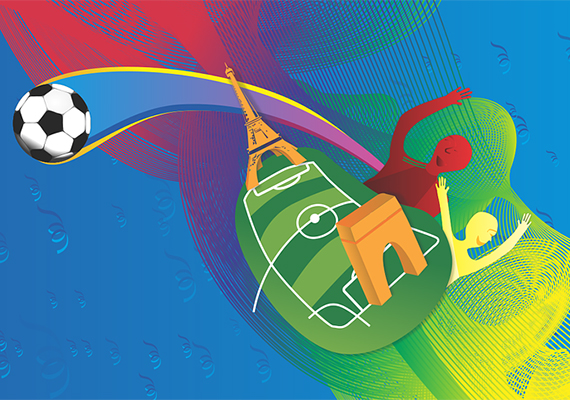
Total attendances of 2.5 million, TV audiences averaging 200 million for every match… The European Football Championships have become a global phenomenon. Ten brands paid small fortunes to sponsor the event. How is the tournament shaping up for them?
1. Sponsorship revenues have risen by 4,500% since 1992
When Euro 1992 took place in Sweden with just eight teams taking part, the total sponsorship revenues taken in by the event were the equivalent of a meagre €9.7 million.
Fast-forward to Euro 2016, now a 24-team, globally broadcast tournament. After taking in an astonishing €314 million in 2012, UEFA‘s predicted revenue for this year has skyrocketed to €450 million – a 50% increase in the last four years, and a dizzying 46 times higher than 1992’s event.
Individual sponsorship fees are hard to come by due to confidentiality agreements, but certain estimates have been published. For example, UEFA’s newest sponsor, electronics manufacturer Hisense, has widely been reported to be spending between €40 and €60 million for the tournament. Some news outlets have estimated Socar’s fees to be even higher, near the €80 million mark.
2. You’re probably remembering the wrong brands
Quick, write down five brands you would associate with Euro 2016. Done? Excellent: there’s a good chance that at least a couple of those have absolutely no official link to UEFA or the European Championships played this summer.
Online marketing firm RadiumOne carried out a study on 1,000 British football fans, asking them to spontaneously list five companies they associated with the tournament. Out of the top 10 brands named, 6 are not official tournament sponsors. While the top two do have deals with UEFA (Coca-Cola 11.7%; Adidas 10.5%), the third most named was sports clothing brand Nike (8.9%), not a partner.
In fact, it seems that out of UEFA’s ten official global sponsors for the tournament, only four (the two above, Carlsberg and McDonalds) are remembered at all. No other brand placed amongst the top 17 in the survey, while three sponsors (Continental, Turkish Airlines and Socar) received absolutely no mentions whatsoever.
Why does this happen? Well, there are a couple of reasons. Firstly, every ‘non-sponsor’ in RadiumOne’s top 10 is a current partner of some other major football competition – whether it’s the World Cup, the Champions League or the Premier League. It’s likely a certain ‘crossover’ occurs (and thus should also happen with the other tournaments and brands). Secondly, the survey was limited to the British Isles – it’s easy to imagine different results in other countries, with different cultural biases (for example, Turkish Airlines or Orange should have a higher standing in their countries of origin). Still, it’s an interesting question to ask: for a major brand, do individual sponsorships have a real impact or is it simply important to ‘be in the mix’?
Aside from this, there’s also the examples of unofficial brands taking advantage of the tournament. The opportunities for so-called ‘ambush marketing’ have expanded thanks to social media.
3. Some bigger brands are failing to make an impact
These are the third European Championships of the social media age (only the second for mobile networking) and thus, outside the stadiums, the focus of each sponsor’s commercial team lies on brand engagement. In that respect, there has been a clear winner – and a clear loser – in the sponsorship battle.
According to the Brand Agility Index study conducted by PR firm Waggener Edstrom Communications and updated after every match-day, Orange leads the table with 71 points (based on the campaign’s scalability, relevance, the speed in which the brand responds on social media, engagement, originality, personalisation and sentiment), comfortably ahead of the other nine official sponsors. At the other end, trailing with just 36 points, McDonalds has proven to be particularly unpopular. The study puts this down to the multinational’s stagnant position towards “the global negativity currently surrounding advocators of unhealthy foods”.
4. One beer ad a minute… Despite alcohol TV ban
French regulations on television advertising faced UEFA with a bit of a conundrum. Alcohol sponsorship of sporting events and alcohol advertising on television is banned in France, yet Carlsberg is one of the tournament’s major partners. This already caused headaches in the past: in 1998, when France held the World Cup, this Loi Évin “made it impossible for the American brewer Anheuser Busch” to sponsor the tournament, despite lobbying of the French government.
How has the Danish brewery wriggled out of this law? By “replacing its brand name on pitch-side digital boards with one of its well-known slogans, in the brand’s font”. This means that the brand (via the word “Probably”, a very recognisable part of their slogan) could be seen on billboards during the match, interviews and other tournament-related activities.
Alcohol Concern, a UK-based charity, calculated that English and Welsh viewers have been exposed to an alcohol-related ad these Euros an average of 78 times per game – that is, essentially, once a minute. This does not include half-time or pre/post-game advertising slots (the BBC doesn’t broadcast third-party adverts), so that figure in other countries could be much higher.
5. Brand sponsorship is no longer a first-world game
Western brands have generally held a stranglehold on football (and sports in general) partnerships. European, North American and Japanese/Korean names usually won’t leave one iota of advertising boards uncovered.
But with international tournaments becoming increasingly attractive on a global scale (even regional games like the Euros), thanks in no small measure to easier access to broadcasts in less developed countries, companies from NICs (newly industrialised countries) and under-developed nations have tried to make a name for themselves during the European Championships.
Thus, three of the main official sponsors for the Euro 2016 are Turkish Airlines (Turkey), Hisense (China) and SOCAR (Azerbaijan). Similar partnerships should be expected for future tournaments – in particular the 2018 and 2022 World Cups (hosted by Russia and Qatar, respectively) and the 2020 Euros, played simultaneously across 12 countries (including Azerbaijan).







